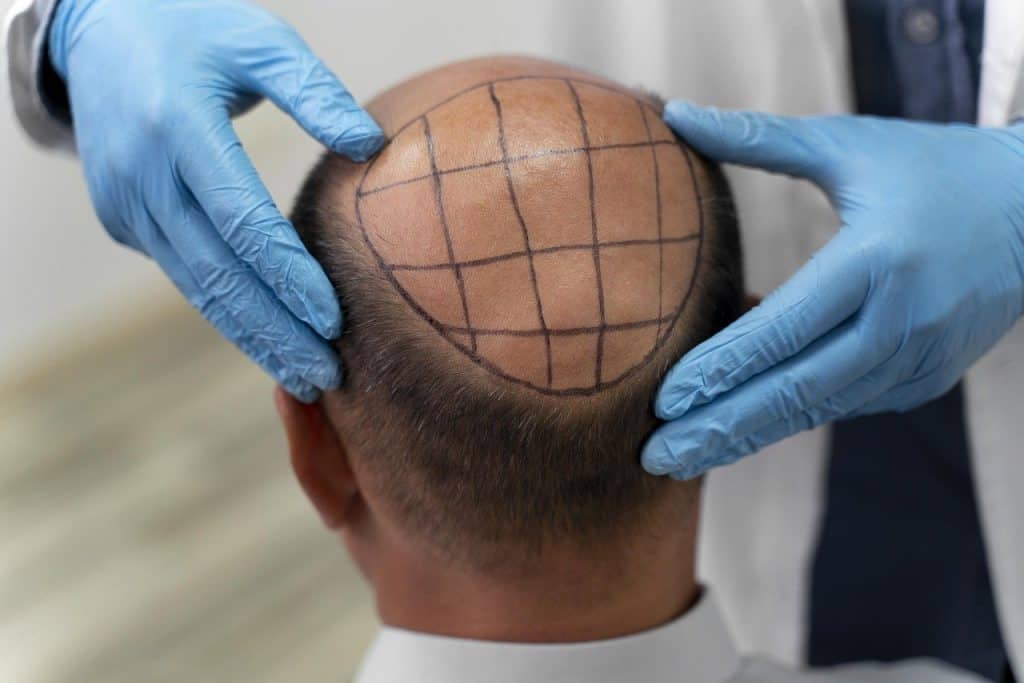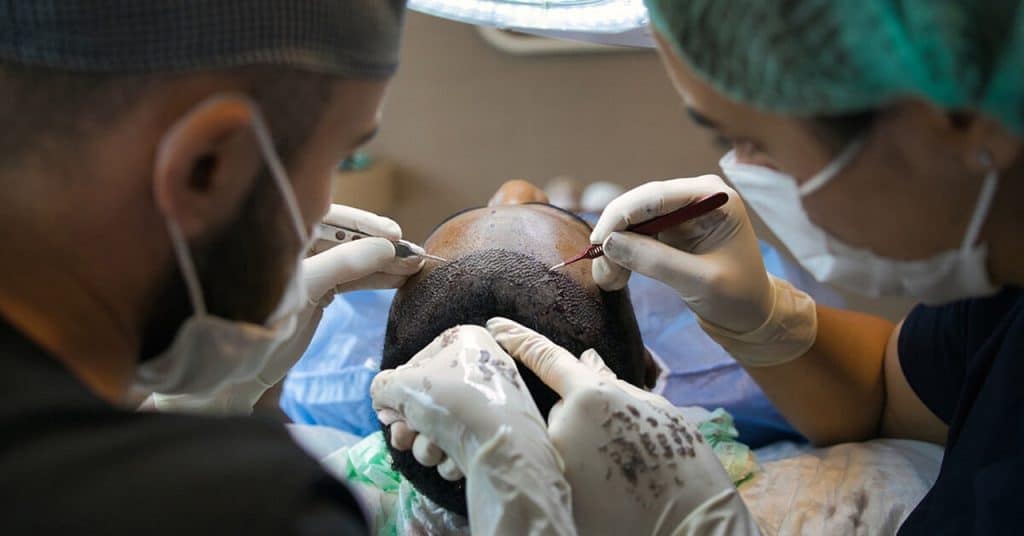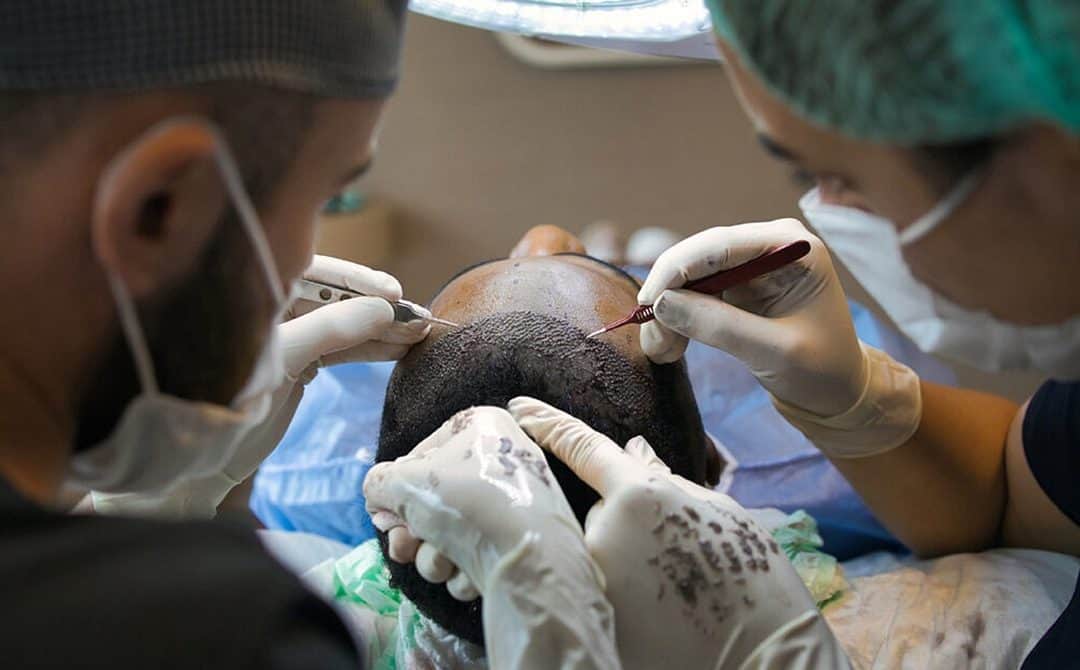So, you’ve been dealing with thinning or receding hairline, and you’re longing to restore it to its former glory. Well, look no further because a game-changing solution has arrived: Afro Type Hair Transplant.
This groundbreaking procedure caters specifically to individuals with Afro-textured hair, offering a transformation that embraces and enhances their natural beauty. If you’ve been on the lookout for a hair loss solution that understands and caters to your unique needs, keep on reading.
Afro Type Hair Transplant promises to revolutionize the world of hair transplants, helping you regain confidence and rock those luscious, full locks once again.
What is Afro Type Hair Transplant?
Definition
Afro type hair transplant is a surgical procedure performed to restore hair in individuals with Afro-textured hair. This type of hair transplant specifically addresses the unique characteristics and needs of Afro-textured hair, which tends to have tight curls and a coarser texture. The procedure involves transplanting hair follicles from the donor area to the recipient area, providing a natural-looking head of hair that matches the individual’s Afro type.
Characteristics of Afro type hair
Afro type hair, also known as Afro-textured hair or curly hair, has distinct characteristics that set it apart from other hair types. It is characterized by tightly coiled or curled hair strands that can vary in thickness and density. This hair type tends to be more fragile and prone to dryness, which can make it more challenging to manage. Afro hair also has a natural tendency to grow upward, creating a unique texture and volume.
Reasons for Afro type hair transplant
There are various reasons why individuals with Afro-textured hair may consider a hair transplant:
- Hair loss: Afro type hair loss can be caused by genetics, hormonal imbalances, medical conditions, or certain hair care practices. Hair transplant surgery offers a long-term solution to restore hair growth in areas of thinning or balding.
- Desired aesthetic: Some individuals may simply desire a fuller head of hair or want to enhance their natural Afro type. Afro type hair transplant allows individuals to achieve the desired aesthetic, creating a more defined hairline or filling in areas of sparse hair.
- Cultural and personal reasons: Hair is an essential aspect of cultural identity for many individuals with Afro-textured hair. Afro type hair transplant can help individuals reclaim their cultural heritage and boost their self-confidence by restoring their natural hair.
Preparing for Afro Type Hair Transplant
Consultation with a specialist
Before undergoing Afro type hair transplant, it is crucial to schedule a consultation with a qualified specialist who has experience in performing this type of procedure. During the consultation, the specialist will evaluate your hair and scalp condition, discuss your goals and expectations, and determine if you are a suitable candidate for the procedure.
Medical evaluation
To ensure your safety and the success of the hair transplant, a thorough medical evaluation will be conducted. This evaluation may include blood tests, scalp examination, and assessment of your overall health. The specialist will review any medical conditions or medications that may affect the procedure or recovery process.
Review of medical history
During the consultation, the specialist will inquire about your medical history, including any previous surgeries, allergies, or chronic conditions. It is essential to provide accurate and complete information to minimize potential risks and complications during and after the procedure.

Choosing the Right Surgeon
Experience and expertise in Afro type hair transplant
Selecting a skilled and experienced surgeon is crucial for a successful Afro type hair transplant. Look for a surgeon who specializes in Afro-textured hair and has a proven track record of performing successful procedures. Their expertise and understanding of the unique characteristics of Afro hair will ensure optimal results.
Before and after photos
Reviewing before and after photos of previous patients who have undergone Afro type hair transplant can give you a better idea of the surgeon’s capabilities and the potential outcomes. Pay attention to patients with similar hair texture and patterns as yourself to assess the surgeon’s ability to achieve natural-looking results.
Patient testimonials
Patient testimonials provide valuable insights into the surgeon’s professionalism, quality of care, and patient satisfaction. Reading about the experiences of other individuals who have undergone Afro type hair transplant can help you gauge the surgeon’s reputation and determine if they are the right fit for you.
Procedure of Afro Type Hair Transplant
Harvesting hair grafts
The first step in Afro type hair transplant is the harvesting of hair grafts from the donor area. The donor area is usually the back or sides of the scalp, where hair is genetically resistant to hair loss. The surgeon carefully extracts individual hair follicles or strips of tissue using either the FUT (Follicular Unit Transplantation) or FUE (Follicular Unit Extraction) method.
Recipient site preparation
After the hair grafts have been harvested, the surgeon prepares the recipient site on the scalp where the hair will be transplanted. They make tiny incisions or holes in the scalp, taking into consideration the natural direction and angle of Afro hair growth to achieve the most natural results.
Hair graft implantation
Once the recipient site is prepared, the surgeon meticulously places the harvested hair grafts into the incisions or holes. The placement of grafts is a highly skilled process, ensuring proper alignment, density, and natural-looking results. The surgeon may use different techniques to accommodate the unique curl pattern and texture of Afro type hair.

Recovery and Aftercare
Post-operative instructions
Following Afro type hair transplant, it is essential to follow the post-operative instructions provided by your surgeon. These instructions may include washing and caring for your transplanted hair, avoiding strenuous activities or excessive sweating, and taking any prescribed medication or supplements to aid in the healing process.
Pain management
Discomfort or pain after Afro type hair transplant is usually mild and can be managed with over-the-counter pain medication recommended by your surgeon. It is essential to avoid scratching or touching the transplanted area to prevent damage to the newly implanted grafts.
Follow-up appointments
Regular follow-up appointments are crucial to monitor your progress and ensure proper healing. Your surgeon will assess the growth of transplanted hair, address any concerns or questions you may have, and provide guidance on aftercare and maintenance to optimize the results of your Afro type hair transplant.
Expected Results
Natural-looking Afro type hair
The primary goal of Afro type hair transplant is to provide natural-looking results that seamlessly blend with your existing hair. Skilled surgeons who specialize in Afro-textured hair can create a hairline and density that mimic the natural growth patterns of Afro hair, ensuring a seamless and authentic appearance.
Improved self-confidence and self-esteem
Hair loss can significantly impact an individual’s self-confidence and self-esteem, particularly when it affects Afro-textured hair. Afro type hair transplant can restore lost hair and improve overall aesthetic appearance, allowing individuals to regain their confidence and enhance their self-esteem.
Long-term hair growth
Afro type hair transplant offers a permanent solution to hair loss by transplanting healthy, resistant hair follicles to areas of thinning or balding. Once the transplanted hair follicles establish a blood supply, they will continue to grow naturally and require no additional maintenance or special care.

Potential Risks and Complications
Scarring
As with any surgical procedure, there is a risk of scarring with Afro type hair transplant. However, skilled surgeons use advanced techniques to minimize scarring and ensure discreet placement of incisions in areas that can be easily concealed by natural hair.
Infection
Although rare, there is a risk of infection following Afro type hair transplant. Surgeons take extensive precautions to maintain a sterile environment during the procedure and provide proper post-operative care instructions to prevent infection. It is crucial to follow these instructions diligently to minimize the risk of complications.
Hair loss in surrounding areas
In some cases, individuals may experience hair loss in the surrounding areas of the transplanted hair. This can occur due to various factors, such as hormonal imbalances, genetic predisposition, or inadequate post-operative care. It is important to follow a comprehensive aftercare routine and attend follow-up appointments to monitor and address any potential issues.
Cost of Afro Type Hair Transplant
Factors influencing cost
The cost of Afro type hair transplant can vary depending on several factors, including the surgeon’s expertise, the extent of the procedure, the number of grafts required, and the geographic location of the clinic. It is essential to consult with multiple surgeons and obtain detailed cost estimates to make an informed decision.
Insurance coverage
In most cases, Afro type hair transplant is considered a cosmetic procedure and is not covered by insurance. However, if hair loss is due to a medical condition or injury, insurance may partially or fully cover the cost. It is advisable to check with your insurance provider to determine what coverage, if any, may apply to your specific situation.
Financing options
Many clinics and surgeons offer financing options to help make Afro type hair transplant more affordable. These options may include installment plans, medical credit cards, or third-party financing agencies. Be sure to inquire about these options during your initial consultations and explore what options are available to you.
Alternative Solutions for Afro Type Hair
Wigs and hairpieces
Wigs and hairpieces are non-surgical alternatives for individuals who want to change their hairstyle, cover bald areas, or add volume and length to their Afro type hair. They provide an instant solution without the need for surgery but require regular maintenance and may not provide the same level of naturalness as hair transplant.
Hair extensions
Hair extensions are another non-surgical option that can add length and volume to Afro type hair. They are typically temporary and attached to the existing hair using various methods, such as tape-in, clip-in, or fusion. Hair extensions can help create the appearance of fuller hair, but they do not address the underlying causes of hair loss.
Non-surgical hair loss treatments
There are various non-surgical treatments available for hair loss in individuals with Afro-textured hair. These treatments may include medications, topical treatments, laser therapy, and platelet-rich plasma (PRP) therapy. While they may effectively slow down hair loss or stimulate hair growth, they do not provide the same permanent and natural results as Afro type hair transplant.
Frequently Asked Questions
Who is a candidate for Afro type hair transplant?
Anyone experiencing hair loss or thinning of Afro-textured hair can be a candidate for Afro type hair transplant. It is essential to schedule a consultation with a qualified specialist to assess your suitability for the procedure based on various factors, including the extent of hair loss, hair texture, overall health, and expectations.
How long does the procedure take?
The duration of Afro type hair transplant can vary depending on the number of grafts being transplanted and the complexity of the case. On average, the procedure can take anywhere from four to eight hours. The surgeon will provide a more accurate time estimate during the consultation, tailored to your specific needs.
Will the transplanted hair require special care?
No, the transplanted hair will not require any special care once it has fully grown. It can be treated and styled just like your natural Afro type hair. However, it is important to maintain good overall hair care practices and follow any specific aftercare instructions provided by your surgeon to ensure optimal results and long-term hair growth.
In conclusion, Afro type hair transplant is a specialized procedure designed to address the unique characteristics and needs of individuals with Afro-textured hair. It offers an effective and permanent solution to hair loss, providing natural-looking results and restoring self-confidence. By consulting with a skilled surgeon and following proper aftercare, individuals can achieve the desired aesthetic and enjoy long-term hair growth. While there are alternative solutions available, such as wigs or non-surgical treatments, Afro type hair transplant remains the most reliable and authentic option for those seeking to restore their Afro type hair.

